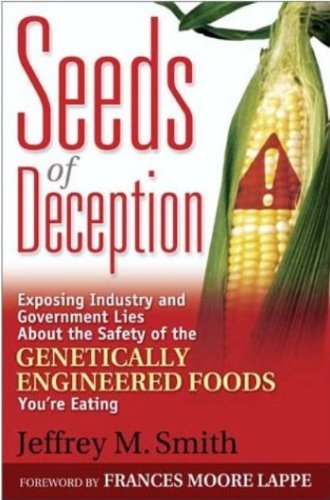Seeds of Deception

Note: I wrote this review many years ago when genetic modification (GM) was relatively new and the benefits were hard to see for the risk being taken. My thinking has evolved over time as I think most GM crops have been proven to be safe by now, but I don't at all think having a cautious approach to them then was a bad thing. I don't think we should just allow free reign to the biotech companies to release organisms into the wild and am still very much against those with a laissez-faire attitude to laboratory genetic modification. There are many potential benefits and pitfalls, anyone who argues either side of this to the exclusion of the other is I think an idealogue.
I was manning my first Greenpeace stall at a cool place called "Northey Street City Farm", which is this organic farming cooperative thing, on some reclaimed flood land in the heart of Brisbane where I live. The theme of the day was a "GE Free Picnic" and there were a number of speakers, by far the best was the author of this book.
The purpose of the book is to try and get some information out about all the problems that genetically modified foods have had. In the US they are supposed to be overseen by the Food and Drug Administration (FDA) but in reality, this is a group of political appointees spouting the same "biotech will save the world" of the politicians who appointed them to do that very job. Instead of research into the safety of foods, they prefer to trust the paid studies of Monsanto and their corporate brethren. Paid studies which time and again involve poor science that seems more aimed at missing problems than finding them.
Not all people at the FDA are corporate lackeys, many of the scientists do good work, find problems, protest to the FDA leadership and to the US Congress about problems with genetically modified foods, but money rules our world, not science, and they are told to be quiet or gotten rid of.
It is a disgrace what is going on with genetically modified food, showing the worst aspects of corporate culture trying to sell us products we don't want, trap us into a cycle of dependence on them, and showing complete disregard for the health concerns of the community. The laughable thing is that they make it out as a "science versus superstition" argument, which allows them to ignore any concerns people have. What the long term effects of putting a fish gene into a tomato are completely unknown, but the corporations like Monsanto (who bought you agent orange, the effects of which still haunt the Vietnamese people) don't really give a damn, they are in this for control of your food, and the profits that will bring.
Because of the virtually random way genes are shot at DNA, you need some mechanism to tell which DNA has the new gene and which doesn't. The solution to this is to place an antibiotic-resistant gene onto the foreign gene, then kill all the other DNA with antibiotics, and the remaining DNA has the new foreign gene. What antibiotic resistance this is going to add to organisms (potentially us) with our medical community already worried that drugs won't be able to treat many of today's diseases in the future, is unknown. You need to know the facts because our corporate-controlled media sure isn't going to give them to you, you need to read books like this before you put biotechnology into your complex system that is our environment.
Once this genie gets out of the bottle, who knows whether we will ever be able to put it back in again.
Find this book
Search for a second hand copy of Seeds of Deception on World of Books